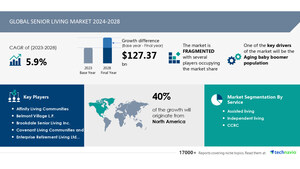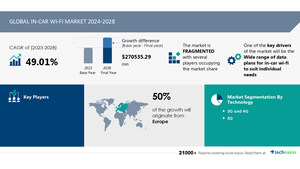NEW YORK, Sept. 6, 2024 /PRNewswire/ -- Report on how AI is redefining market landscape- The global agrochemicals market size is estimated to grow by USD 51.2 million from 2024-2028, according to Technavio. The market is estimated to grow at a CAGR of over 4.51% during the forecast period. Increasing use of herbicides is driving market growth, with a trend towards implementation of integrated pest management (IPM) as new method of crop protection. However, organic farming: viable substitute poses a challenge. Key market players include American Vanguard Corp., Archer Daniels Midland Co., Arysta LifeScience Corp., BASF SE, Bayer AG, Cargill Inc., CF Industries Holdings Inc., Corteva Inc., Drexel Chemical Co., Evonik Industries AG, FMC Corp., Gharda Chemicals Ltd., Haifa Negev technologies Ltd., Koch Industries Inc., Nissan Chemical Corp., Nufarm Ltd., Nutrien Ltd., Rotam CropSciences Ltd., Syngenta Crop Protection AG, and Yara International ASA.
Key insights into market evolution with AI-powered analysis. Explore trends, segmentation, and growth drivers- View the snapshot of this report
Agrochemicals Market Scope |
|
Report Coverage |
Details |
Base year |
2023 |
Historic period |
2018 - 2022 |
Forecast period |
2024-2028 |
Growth momentum & CAGR |
Accelerate at a CAGR of 4.51% |
Market growth 2024-2028 |
USD 51.2 million |
Market structure |
Fragmented |
YoY growth 2022-2023 (%) |
4.09 |
Regional analysis |
APAC, North America, Europe, South America, and Middle East and Africa |
Performing market contribution |
APAC at 49% |
Key countries |
China, US, India, Brazil, and Japan |
Key companies profiled |
American Vanguard Corp., Archer Daniels Midland Co., Arysta LifeScience Corp., BASF SE, Bayer AG, Cargill Inc., CF Industries Holdings Inc., Corteva Inc., Drexel Chemical Co., Evonik Industries AG, FMC Corp., Gharda Chemicals Ltd., Haifa Negev technologies Ltd., Koch Industries Inc., Nissan Chemical Corp., Nufarm Ltd., Nutrien Ltd., Rotam CropSciences Ltd., Syngenta Crop Protection AG, and Yara International ASA |
Market Driver
Agrochemicals, specifically pesticides, play a significant role in pest control for farmers, accounting for approximately 35% of their production costs. However, pests cause losses ranging from 11% to 32%. The increasing resistance of pests to pesticides and concerns over environmental and health issues have led to a decrease in their usage. Integrated Pest Management (IPM) is an effective alternative, which involves preventing pests through systemic resistance and proper operational design. IPM incorporates inspection, monitoring, reporting, and strategic pesticide application during a pest's life cycle. Innovations in IPM techniques and technologies are anticipated to boost the global agrochemicals market growth during the forecast period.
Agrochemicals, including pesticides like herbicides, fungicides, and insecticides, and fertilizers, play a significant role in modern agriculture. These essential tools help protect crops from pests and enhance crop yields. Pesticides shield against attacks from agricultural pests, safeguarding crops such as cereals and grains, oilseeds and pulses, fruits, and vegetables. Fertilizers, such as nitrogen, phosphoric, and potassic fertilizers, enrich arable lands with essential plant nutrients, boosting crop production. Fertigation and nitrogenous fertilizers like synthetic ammonia, nitric acid, and urea are popular choices. The organic fertilizer sector, including Neem cake and bio fertilizers, is gaining traction due to health, food safety, and environmental concerns. Regulations focusing on animal welfare and organic food businesses further fuel the market's growth. Agrochemicals benefit various agricultural sectors, including animal husbandry and animal feed production. Urbanization and the expanding agricultural industry continue to drive the demand for these vital products.
Request Sample of our comprehensive report now to stay ahead in the AI-driven market evolution!
Market Challenges
- Organic farming is a method of crop and livestock production without the use of synthetic pesticides, fertilizers, antibiotics, and genetically modified organisms. This approach promotes sustainable and harmless environments through practices such as crop rotation, cover crops, and balanced relationships between hosts and predators. Organic farming also recycles nutrients back into the soil through the use of composted manure and organic crops. The European Commission has set permissible contamination levels for certain toxic metals and minerals, which are approximately 48% lower in organic crops than in conventionally grown crops. Organic crops also contain higher levels of antioxidants, reducing the risk of chronic diseases, and have fourfold less pesticide residue than conventional crops. With increasing consumer awareness and health concerns, the demand for organic food is on the rise, leading to less use of agrochemicals and a positive impact on the growth of the global agrochemicals market. Organic farming is a professional and sustainable approach to agriculture that prioritizes the health of consumers and the environment.
- The Agrochemicals market faces several challenges in various sectors. In cereals and grains, ensuring yield and quality is crucial. Oilseeds and pulses require protection against pests like sorghum aphids and soybean rust. Fruits and vegetables demand careful fertigation and use of crop protection chemicals to combat pests and diseases. Nitrogenous fertilizers, including synthetic ammonia, nitric acid, ammonium nitrate, urea, and anhydrous ammonia, are essential for plant growth. However, health, food safety, and environmental protection concerns necessitate careful usage. Crop protection products are vital for agriculture and animal husbandry, but regulations on animal welfare and organic food businesses impact their use. Organic fertilizers, such as neem cake, are gaining popularity due to health and environmental benefits. Industrialization and urbanization put pressure on arable lands, necessitating efficient use of plant nutrients from potassium fertilizers, phosphorus fertilizers, and bio fertilizers. Rodenticides and bactericides are crucial for animal feed production. Balancing these needs while adhering to regulations is a significant challenge for the Agrochemicals market.
Discover how AI is revolutionizing market trends- Get your access now!
Segment Overview
This agrochemicals market report extensively covers market segmentation by
- Product
- 1.1 Fertilizers
- 1.2 Pesticides
- Application
- 2.1 Cereals and grains
- 2.2 Oilseeds and pulses
- 2.3 Fruits and vegetables
- Geography
- 3.1 APAC
- 3.2 North America
- 3.3 Europe
- 3.4 South America
- 3.5 Middle East and Africa
1.1 Fertilizers- Agrochemicals market comprises various segments, with fertilizers being a significant contributor. Fertilizers are essential for enhancing crop productivity and ensuring nutrient supply to plants. Nitrogenous, phosphatic, and potassic are the primary types of fertilizers. Nitrogenous fertilizers, such as urea, ammonia, and ammonium nitrate, are widely used due to their high nitrogen concentration and cost-effectiveness. Urea-based fertilizers are particularly popular for cultivating cereals, pulses, and oilseeds. Phosphatic fertilizers, which accounted for the second-largest segment in 2023, provide phosphorus, an essential macronutrient for optimum crop production. Phosphorus is crucial for nucleic acid formation and protein synthesis in plants. Diammonium phosphate (DAP), monoammonium phosphate (MAP), and superphosphate are common phosphate fertilizers used to address phosphorus deficiency in soil. Their extensive use in grains and oilseeds cultivation is expected to fuel segment growth. Potassic fertilizers, the third major type, improve moisture absorption and strengthen plant immunity. Potassium-based fertilizers, such as potassium chloride, potassium nitrate, and potassium sulfate, increase protein content in plants and protect them from pests and diseases. Their affordability and availability make them popular choices for cultivating rice, cereals, grains, and tubers. The growing demand for nutritious food to meet the increasing population's needs is expected to drive the fertilizers segment in the global agrochemicals market during the forecast period.
Download a Sample of our comprehensive report today to discover how AI-driven innovations are reshaping competitive dynamics
Research Analysis
Agrochemicals, a vital segment of the agricultural industry, encompasses a range of products including pesticides, herbicides, fungicides, insecticides, and fertilizers. These chemicals play a crucial role in enhancing crop yields by protecting against agricultural pests and providing essential nutrients to the soil. The ecosystems of various agricultural sectors, such as cereals and grains, oilseeds and pulses, fruits and vegetables, and animal husbandry, significantly benefit from the use of agrochemicals. Fertilizers, specifically nitrogen, phosphatic, and potassic fertilizers, contribute to improving soil fertility and nutrient availability. Fertigation, a method of applying fertilizers directly to the root zone, has gained popularity for its efficiency and effectiveness. The demand for agrochemicals is driven by the need to increase crop productivity on arable lands, offsetting the challenges posed by urbanization and industrialization. Organic and inorganic fertilizers, including anhydrous ammonia and nitrogenous fertilizers, cater to different farming practices and environmental considerations.
Market Research Overview
Agrochemicals refer to a broad range of substances used to enhance crop yields and protect against agricultural pests. These include pesticides such as herbicides, fungicides, insecticides, and rodenticides, as well as fertilizers like nitrogen, phosphatic, and potassic fertilizers. The ecosystems of various agricultural sectors, including cereals and grains, oilseeds and pulses, fruits and vegetables, and animal husbandry, benefit significantly from the use of these agrochemicals. Fertilizers, such as nitrogenous fertilizers derived from synthetic ammonia, nitric acid, and urea, provide essential plant nutrients. Pesticides protect crops from pest attacks, ensuring food safety and maintaining health standards. However, concerns regarding health, food safety, environmental protection, and animal welfare regulations have led to the growth of the organic fertilizer sector. Bio fertilizers, neem cake, and other organic crop protection products offer sustainable alternatives. The agricultural sectors face challenges from urbanization and industrialization, which lead to the conversion of arable lands. Agrochemicals play a crucial role in maximizing crop yields on these lands while minimizing environmental impact. The future of the agrochemicals market lies in the development of eco-friendly and sustainable agrochemical solutions.
Table of Contents:
1 Executive Summary
2 Market Landscape
3 Market Sizing
4 Historic Market Size
5 Five Forces Analysis
6 Market Segmentation
- Product
- Fertilizers
- Pesticides
- Application
- Cereals And Grains
- Oilseeds And Pulses
- Fruits And Vegetables
- Geography
- APAC
- North America
- Europe
- South America
- Middle East And Africa
7 Customer Landscape
8 Geographic Landscape
9 Drivers, Challenges, and Trends
10 Company Landscape
11 Company Analysis
12 Appendix
About Technavio
Technavio is a leading global technology research and advisory company. Their research and analysis focuses on emerging market trends and provides actionable insights to help businesses identify market opportunities and develop effective strategies to optimize their market positions.
With over 500 specialized analysts, Technavio's report library consists of more than 17,000 reports and counting, covering 800 technologies, spanning across 50 countries. Their client base consists of enterprises of all sizes, including more than 100 Fortune 500 companies. This growing client base relies on Technavio's comprehensive coverage, extensive research, and actionable market insights to identify opportunities in existing and potential markets and assess their competitive positions within changing market scenarios.
Contacts
Technavio Research
Jesse Maida
Media & Marketing Executive
US: +1 844 364 1100
UK: +44 203 893 3200
Email: [email protected]
Website: www.technavio.com/
SOURCE Technavio

WANT YOUR COMPANY'S NEWS FEATURED ON PRNEWSWIRE.COM?
Newsrooms &
Influencers
Digital Media
Outlets
Journalists
Opted In





Share this article